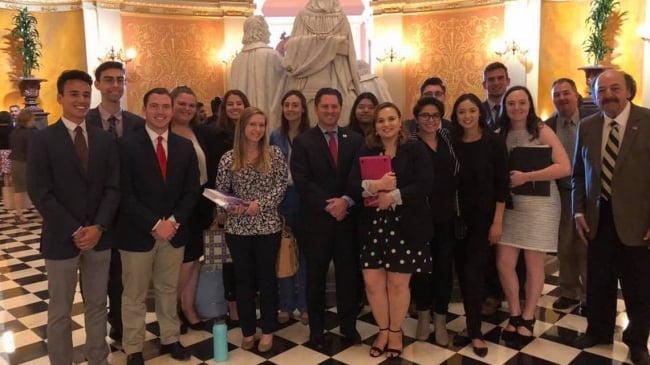You have /5 articles left.
Sign up for a free account or log in.

Students pose in the State Capitol after taking part in a committee hearing. Assemblyman Jordan Cunningham can be seen in the center. On the far right is former Assemblyman Katcho Achadjian, and next to him, Professor Chris Den Hartog.
Justin Wellner, courtesy of Chris Den Hartog
Students in a political science class at California Polytechnic State University embarked on an unusual challenge last year. They drafted legislation to see if they could get it passed by the state Legislature.
The bill became law this past summer. In the process, the students learned how lawmaking works and got invaluable experience on using the political process to push for change -- even if it's only incremental change -- on a higher ed issue close to their hearts.
The students in the California Bill Project class set out to write a bill that would benefit fellow California students but not cost the state any money.
The undergraduate course was introduced at the San Luis Obispo campus in fall 2017 at the suggestion of former State Assemblyman Katcho Achadjian, who was also a volunteer instructor and adviser to the class.
The students’ first idea was to write a bill compelling university administrators to disclose exactly how student fees are spent. But the class quickly established this idea wouldn’t work, said Chris Den Hartog, the professor who teaches the class.
“Staffers in the Assembly told me the Legislature is very wary of getting involved in the inner workings of universities,” he said.
Plan B was to tackle another issue -- the exorbitant cost of textbooks.
Although many universities have initiatives to reduce textbook costs -- either through inclusive-access programs, textbook rental programs or the development and adoption of open educational resources -- Cal Poly students still had some professors who assigned the latest edition of expensive textbooks for their classes.
Students can save money by buying older editions of textbooks. But Den Hartog said many of his students consider buying old editions risky.
“I had one student tell me they had almost failed a math class because they picked up an older version of a textbook. It was the same except that the problems at the end of the chapters had been reordered,” he said. “They did the wrong problems for an assignment.”
Initially, the students wanted to write legislation that would prevent publishers from publishing new editions of textbooks unless they genuinely contained new material. But their proposal would have been “controversial” and “difficult to pass,” said Den Hartog. Publishers would have used their considerable lobbying clout and fiercely opposed it, he said.
The class decided instead to draft a bill requiring publishers to specify the differences between textbook editions and to do so prominently on their websites. Their proposal would be an update to an existing bill that urges publishers to take steps to reduce costs for students.
After getting pushback from publishers and lawmakers, the class agreed to change the language of the bill so that it only urged, but did not compel, publishers to provide this information.
Jordan Cunningham, a Republican state assemblyman representing the 35th District -- covering San Luis Obispo County and portions of Santa Barbara County -- sponsored the measure and described it in a Facebook post as "an important bill to help make higher education more affordable."
Assembly Bill 2385 was unanimously approved by the State Legislature in early August and signed into law by Governor Jerry Brown on Aug. 27.
Den Hartog acknowledges the bill is weak because compliance is voluntary, but he said the process was “not all compromise.”
“The publishers were asking for amendments that would have watered the bill down even more,” he said.
His students pushed back. “They felt the amendments went too far; they would have made it completely meaningless.”
The goal of the class was not to pass a bill at any cost, but to give students hands-on experience in writing legislation. He's proud that his students were able to get state lawmakers to pass a bill.
“It’s hard to pass a bill -- there are so many ways for a bill to die. It’s never a sure thing that it’s going to get through,” he said. “There was a lot of pessimism from my contacts that we would be able to do it.”
Den Hartog thinks the impact of the bill will likely be small because there are no legal consequences for publishers if they don’t comply.
“But it does lay out some best practices for publishers,” he noted. “There are many instances where they could do more.”
While some publishers already publicly share information about the differences between textbook editions, Den Hertog said the sectorwide picture “is a complete patchwork.”
He hopes the bill will at least nudge publishers toward greater transparency.
“There are millions of students in California, even if this only helps a tiny proportion of those students -- it’s still a large number of students,” he said.
Victoria Tonikian, a student who took the California Bill Project class in 2017 and graduated last December, said despite numerous revisions to the bill, she was happy with the final language.
"I think it was very representative of our original goal," she said.
James Curry, assistant professor of political science at the University of Utah, said more students need get hands-on legislative experiences like the California Bill Project. At Utah, Curry runs a course called the Capital Encounter Program, where students develop policy proposals and then go to Washington to advocate for them.
“This is the kind of class that teaches students how to be politically engaged and active citizens,” said Curry. “Given how low voter turnout is among young people, we should be doing more to help students learn how to become involved in political processes.”
Tonikian said prior to taking the class she had "a very vague understanding of what the California state legislative process looked like or how it worked." Now she understands "what our elected officials do on a daily basis."
"As a recent college graduate, having an experience such as this one on my résumé has been a great asset and conversation starter," she said. "I don't think many individuals, whether in college or beyond, can say that they've assisted in writing and passing a law."
It's still an open question whether publishers will start volunteering more information about textbook editions when the bill goes into effect in January 2019.
“We have not seen any indication from the publishers one way or another, though we hope they comply,” said Nick Mirman, chief of staff for Assemblyman Cunningham.
Scott Overland, director of media relations for Pearson, said the company's policy on highlighting changes between textbook editions meets the requirements of the Higher Education Opportunity Act of 2008, which requires publishers to disclose the difference between textbook editions when marketing them to professors.
“As a matter of policy, we also outline updated content in the preface of new editions,” said Overland. He said Pearson would be reviewing the California bill.
Publishers Cengage and Wiley also issued statements saying that they are reviewing the bill and looking for ways to ensure students have easy access to information about textbook editions.
“We understand the students’ desire for this information and applaud them for championing this bill,” said Lauren Andrich, senior manager of global communications and media for Wiley.
Kaitlyn Vitez, director of the U.S. Public Interest Research Group’s Campaign to Save Student Aid, praised the Cal Poly students for their work but said she would rather see more effort "put into developing more open and accessible course materials."
Mike Hale, vice president of education for North America at digital content provider VitalSource, said publishers did “compress” edition cycles in the past in order to boost print textbook sales.
But many publishers are shifting from print to digital business models and focusing more on digital subscription models and inclusive-access offers.
“The publishers don’t want to be wedded to an edition-based world. They want to keep pushing their digital business,” said Hale.
Still, he doesn't believe publishers will volunteer information that could potentially limit the sale of new textbook editions.
“I don’t think they’ll do it, unless there’s a downside to not doing it,” he said.




